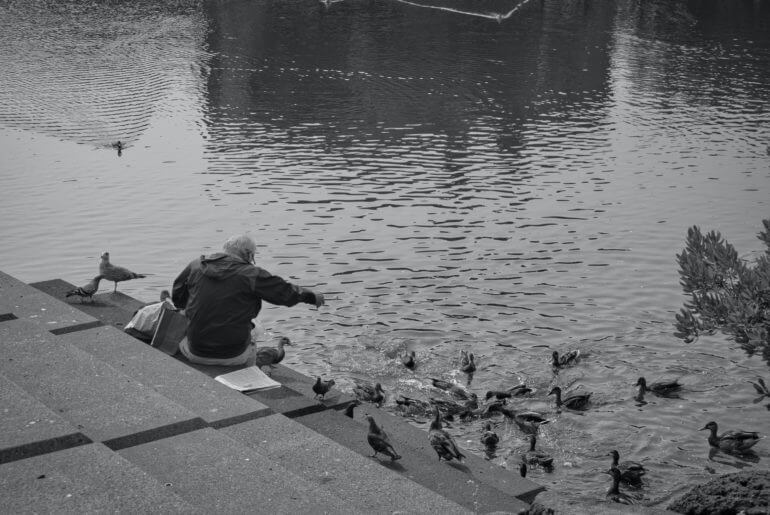
What is Tashlich?
Dear Jew in the City,
What is tashlich? Does it really have to be done by a pond with ducks? Do we really have to throw bread in the water?
Sincerely,
Noah
Thanks for your question, Noah. Tashlich is a prayer typically recited on Rosh Hashana afternoon, intended to help guide us in the process of teshuvah (repentance). It’s a relatively young practice – first recorded in the 15th century – though there is reason to suspect that it dates back much farther, or is based on earlier practices. Tashlich should be recited at a natural body of water; optimally, the body of water should be outside the city and contain fish (see Kitzur Shulchan Aruch 129:21, among other authorities. I’m not sure where you got ducks from). And actually, despite common misconception, when recited on Rosh Hashana, bread should not be thrown.
First, let’s discuss why tashlich is recited at a body of water. As usual, there are a number of symbolic reasons.
The Maharil writes that following the Rosh Hashana meal people would go to rivers and lakes to symbolically discard their sins. This was done in remembrance of the akeidah (the binding of Isaac). According to the Midrash in Yalkut Shimoni, when Avraham and Yitzchak were en route to the akeidah, the accusing angel tried to stop them by turning into a river. Avraham forged ahead, even though the raging waters came all the way up to his neck.
Another reason is because I Kings chapter 1 describes how David had his son Shlomo brought to the Gichon spring for his coronation. The Talmud in Horayos (12a) derives from this that kings should be crowned at a body of water. Since Rosh Hashana is the day each year that we crown Hashem as King over us, it is appropriate for us to recite tashlich at a body of water.
Still another reason is the example of Ezra the Scribe, who gathered the people on Rosh Hashana at the Water Gate, as detailed in Nehemiah chapter 8.
So why should the body of water have fish in it? Again, there are different symbolic explanations for this. Among these are: fish live precarious lives, always in danger of being caught. We are similarly in a precarious position because of our impending judgment (Levush); fish are blessed to be prolific, which is something we pray for on Rosh Hashana (Rema); fish are immune to the ayin hara (“evil eye”), from which we also seek protection (ibid.). There are other explanations, as well.
This mistaken practice to throw bread goes all the way back to tashlich’s earliest days. The name “tashlich” – meaning to cast out or to throw away – comes from Micah 7:19, which refers to casting our sins into the ocean depths. When performing tashlich, we metaphorically cast our sins into the sea. Some people take the casting thing too literally, no doubt inspired by Koheles (Ecclesiastes) 11:1, “Cast your bread upon the waters, because you will find it after many days.” That’s not the “casting” to which “tashlich” refers.
You might think, “If you want to throw bread, why not throw bread?” Well, actually, there’s a halachic problem with that. Assuming that one performs tashlich on Rosh Hashana – which is optimum – it’s prohibited to feed wild animals on yom tov (Shabbos 155b, OC 324, et al.). Going to a body of water that contains fish and throwing them bread in contravention of Jewish law is a strange way to demonstrate our Rosh Hashana teshuvah.
(At the risk of being a complete and utter killjoy, many people have the practice to feed the birds on Shabbos Shirah. Feeding wild birds presents the same halachic issues as feeding wild fish. Happily, the details are beyond our current scope.)
Another problem with the bread-throwing is that it involves carrying. I know what many of you are now thinking: But you’re allowed to carry on yom tov! Well… yes and no. We’re allowed to carry things we need for yom tov without an eiruv, but we can’t carry gratuitously. Since we’re not allowed to feed the fish, if you carry the bread outside of an eiruv, that’s now two yom tov violations!
A different practice, much more widely accepted, is to shake out one’s pockets at tashlich. Generally speaking, no one is too concerned about our pocket lint.
If you’re really invested in the bread-throwing thing, there is some good news: tashlich doesn’t have to be performed on Rosh Hashana. Sure, that’s the optimum time for it, but not everyone lives near a body of water. Those who have to travel can perform tashlich until Yom Kippur or, in a real pinch, even until Hoshana Rabbah (which is about three weeks from Rosh Hashana). If you perform tashlich on a post-Rosh Hashana weekday, knock yourself out and throw all the bread you want. (Actually don’t – bread isn’t good for fish or ducks.)
So let’s recap. Teshuvah is the raison d’etre of Rosh Hashana. Hearing the shofar blown is the mitzvah par excellence of the day. Tashlich is a praiseworthy custom, optimally performed on Rosh Hashana to direct our hearts and minds in the proper directions. But throwing bread to the fish? That’s prohibited when tashlich is performed on Rosh Hashana, and generally not a good idea if you care about the wellbeing of your local wildlife.
If you found this content meaningful and want to help further our mission through our Keter, Makom, and Tikun branches, please consider becoming a Change Maker today.







